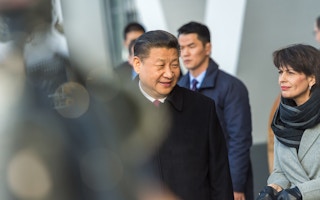Even amid the frenzy surrounding the inauguration of US president Donald Trump, the presence of a communist leader in one of the citadels of global capitalism was a noteworthy event.
To continue reading, subscribe to Eco‑Business.
There's something for everyone. We offer a range of subscription plans.
- Access our stories and receive our Insights Weekly newsletter with the free EB Member plan.
- Unlock unlimited access to our content and archive with EB Circle.
- Publish your content with EB Premium.
The “Xi in Davos” story evolved quickly; from wry ruminations on the sheer novelty - and inherent irony – of it, leader-writers began to focus on his defence of globalisation and opined on a possible new era of Chinese economic leadership.
But a minority noticed another angle: the strong focus on environmental issues that underpinned the comments of many in the Chinese delegation.
The New York Times called it “unexpected”, while the Guardian speculated that China could “take ownership” of the “climate change fight”.
But among the English language heavyweights, only the Financial Times detailed just how much Beijing has already been doing to tackle environmental problems, and not one acknowledged that Beijing had, in fact, quietly taken ownership of this conversation several years before Xi came to Davos.
An unlikely disruption from an unlikely source
Two days after Xi’s high-profile speech, in a meeting room on the periphery of the Davos Congress Centre and away from the spotlighted leaders, another new China-based environmental initiative was quietly formalized.
The Green Digital Finance Alliance is the latest step in China’s sustainability journey, a unique experiment in financial technology geared towards environmental goals and the first global public-private partnership to be co-founded by a Chinese finance company.
Ant Financial is China’s equivalent of PayPal, a platform with around 450 million active users handling 58 per cent of payments in China’s burgeoning e-commerce industry.
In the run-up to the launch in Davos, Ant signed up some 72 million members into a new app that calculates a personalized measure of each member’s carbon footprint, and rewards them for improving that footprint through their online behavior.
The reward comes in the form of trees planted in Mongolia, and within three months of the app’s launch, the active members have obligated Ant to plant a million and a half trees.
For the alliance, the reward is not just about the trees but having access to unfiltered data from a vast user base and the ability to “nudge” those consumers’ understanding and behaviour towards more sustainable actions.
Quite how this one app might serve as a launch pad for a “green fintech” revolution in a global context is still a little murky, but then the app itself is not the point here.
More significant is the unlikely partnership at the heart of the Alliance itself, and the history of its genesis.
From AIIB concerns to G20 success
In 2013, The United Nations Environment Programme (UNEP) began an in-depth global study into green finance, “An Inquiry into Design Options for a Sustainable Financial System”.
Among the less-heralded arms of the UN, the Environment Programme’s brief is to champion sustainability thinking around the world, and one of the drivers of that campaign is Simon Zadek.
An academic and sustainability expert, Zadek became a co-director of the study and moved to Beijing to see if authorities there might be helpful to the Inquiry, maybe even receptive to the idea of reform.
What he found surprised him. Beijing’s attitude to the UN, he told me, was not only much more positive than in the West, but authorities there were ready to both implement a domestic reform agenda and embrace a global role, too.
Within a year, UNEP and the People’s Bank of China had teamed up to launch the Green Finance Task Force, a domestic study that gathered input from a broad range of institutions across China and quickly produced a reform agenda covering fiscal policy, financial standards, regulatory practices and the judicial system.
Enter the G20
Established in the aftermath of the great financial crisis the G20’s Financial Stability Board had come to realise that it needed to include sustainability as one of its considerations in reforming global financial architecture. Yet at the G20 ministerial level, the topic was still considered peripheral to more pressing global issues.
For the chairman of the FSB, Bank of England Governor Mark Carney, that was not enough. As China was preparing to assume the Presidency of the G20, Carney began engaging both with UNEP and Beijing, with remarkable results.
Not only did Beijing announce that it would use its Presidency to push the sustainability agenda, it would do so in partnership with the Bank of England. Most surprising, Zadek says, was the decision to include UNEP, to act as a “secretariat” for what would became “The Green Finance Study Group.”.
Thus was green finance installed as a core component of the finance track of G20 meetings - meaning that finance ministers themselves would need to address it directly - and thus it was that, for the first time ever, the importance of green finance was mentioned in the final communique of the G20.
The pledges and priorities of the Study group were released in full as “The Green Finance Synthesis Report”, and Beijing also issued a new agenda for domestic reform guided by a new set of “Guidelines for Establishing the Green Financial System”.
Meanwhile, the UNEP has updated its Inquiry to take account of what it calls a “dramatic increase in momentum” around the issue, and it was UNEP, and Zadek, that were the driving force behind recruiting Ant Financial into the Green Digital Finance Alliance.
Leadership
It may seem contradictory to present Beijing as a champion of sustainable finance given the extraordinary threat to the environment that so much of the country’s developing industries continue to pose.
Nor can China claim sole responsibility for advancing the sustainability agenda – many smaller countries, from Morocco to Ecuador - have been influential in the process of consultation and innovation that underlie the G20 breakthrough.
But while its focus does remain largely domestic, says Zadek, China “has really become the leading advocate on an international stage in pushing central banks, regulators, stock exchanges and others to take environmental considerations into account.”
At a time when the world’s most powerful nation appears to be losing interest in the topic, perhaps this unlikely collection of actors will be the key to keeping the momentum of achieving sustainable global growth.











